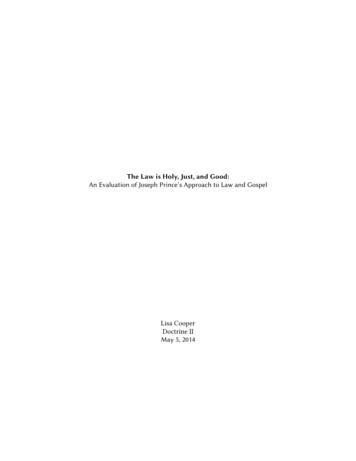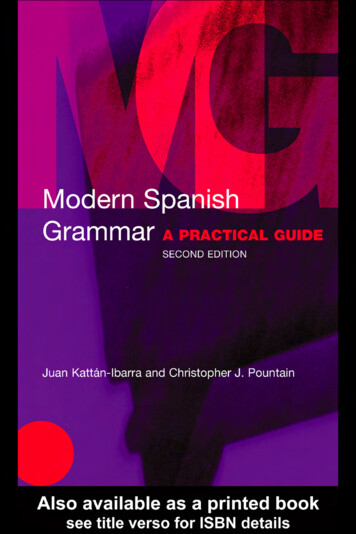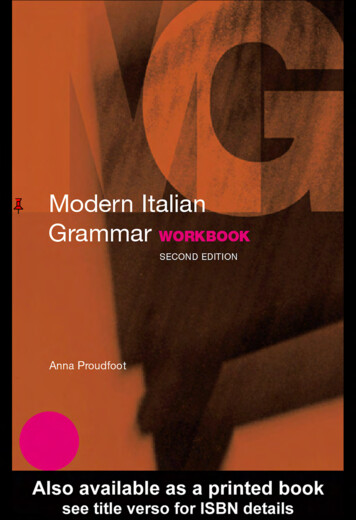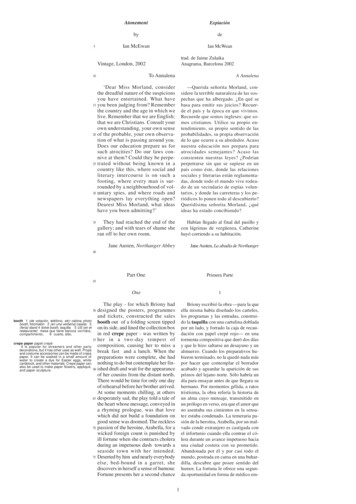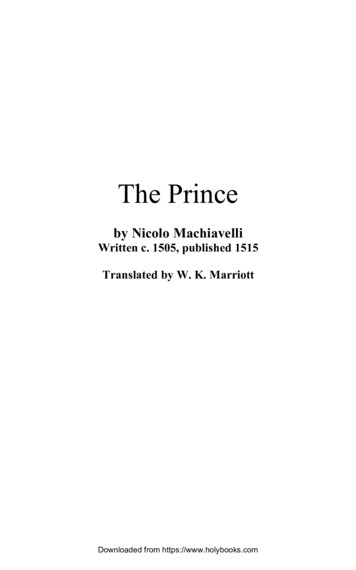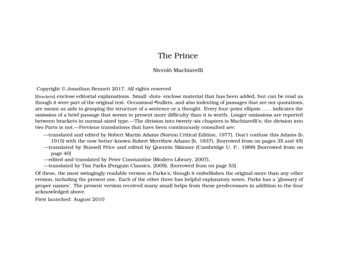
Transcription
The PrinceNiccolò MachiavelliCopyright Jonathan Bennett 2017. All rights reserved[Brackets] enclose editorial explanations. Small ·dots· enclose material that has been added, but can be read asthough it were part of the original text. Occasional bullets, and also indenting of passages that are not quotations,are meant as aids to grasping the structure of a sentence or a thought. Every four-point ellipsis . . . . indicates theomission of a brief passage that seems to present more difficulty than it is worth. Longer omissions are reportedbetween brackets in normal-sized type.—The division into twenty-six chapters is Machiavelli’s; the division intotwo Parts is not.—Previous translations that have been continuously consulted are:—translated and edited by Robert Martin Adams (Norton Critical Edition, 1977). Don’t confuse this Adams (b.1915) with the now better-known Robert Merrihew Adams (b. 1937). [borrowed from on pages 35 and 45]—translated by Russell Price and edited by Quentin Skinner (Cambridge U. P., 1988) [borrowed from onpage 40]—edited and translated by Peter Constantine (Modern Library, 2007),—translated by Tim Parks (Penguin Classics, 2009). [borrowed from on page 53]Of these, the most swingingly readable version is Parks’s, though it embellishes the original more than any otherversion, including the present one. Each of the other three has helpful explanatory notes. Parks has a ’glossary ofproper names’. The present version received many small helps from these predecessors in addition to the fouracknowledged above.First launched: August 2010
The PrinceNiccolò MachiavelliContentsDedication: To his Magnificence Lorenzo Di Piero De’ Medici1Part I: Kinds of principality; how to get and retain them2Chapter 1: Different kinds of principalities, and how to acquire them2Chapter 2: Hereditary principalities2Chapter 3: Mixed principalities3Chapter 4: Why Darius’s kingdom, conquered by Alexander, didn’t rebel against his successors after his death8Chapter 5: How to govern cities or principalities that lived under their own laws before they were annexed10Chapter 6: New principalities that are acquired by one’s own arms and virtù11Chapter 7: New principalities acquired by the arms and the fortuna of others13Chapter 8: Principality obtained through wickedness17Chapter 9: Civil principality20Chapter 10: How to measure the strength of a principality22Chapter 11: Ecclesiastical principalities24Part II: Other aspects of political power26Chapter 12: Different kinds of armies; Mercenaries26Chapter 13: Auxiliaries, mixed armies, citizen armies29Chapter 14: A prince’s military duties31
The PrinceNiccolò MachiavelliChapter 15: Things for which men, especially princes, are praised or blamed33Chapter 16: The free spender and the tightwad34Chapter 17: Cruelty and mercy. Is it better to be loved than feared?35Chapter 18: How princes should keep their word37Chapter 19: How to avoid attracting contempt and hatred39Chapter 20: Are fortresses, and other princely devices, advantageous or hurtful?44Chapter 21: What a prince should do to acquire prestige46Chapter 22: The ministers of princes48Chapter 23: How to avoid flatterers49Chapter 24: Why the princes of Italy have lost their states51Chapter 25: The role of fortuna in human affairs and how to withstand it52Chapter 26: A plea to liberate Italy from the barbarians54
The PrinceNiccolò MachiavelliGlossaryAfrica: At the time Machiavelli is writing about on page 18,‘Africa’ named a coastal strip of north Africa, including someof what are now Tunisia, Algeria, and Libya. The site of cityCarthage is now the site of a suburb of Tunis.element: On page 5 Machiavelli speaks of ‘the more weak’and ‘the more strong’, with no noun. He could be talkingabout (i) weaker and stronger individuals or factions withinthe acquired state, or (ii) weaker and stronger substates orprovinces of which the newly acquired state is made up. Therest of that chapter hooks into (ii); but page 5 also makesMachiavellian sense when taken in the manner of (i); perhapshe meant to be talking about both at once.fortuna: This word occurs nearly 60 times in the work.Most occurrences of it could be translated by ‘luck’, butfor Machiavelli its meaning is clearly broader than that—something more like ‘circumstances beyond one’s control’.The interplay between this and virtù is a dominant themein The Prince. [For a superb discussion of this theme, see J. G. A.Pocock’s The Machiavellian Moment (Princeton University Press, 2003),So fortuna is left untranslated except whereMachiavelli writes of someone’s privata fortuna, meaninghis status or condition as an ordinary citizen (rather thansomeone with rank and power). The five occurrences of thisare all translated by ‘ordinary citizen’. Italian lets us choosebetween ‘it’ and ‘she’ for fortuna, but nothing in this workinvites us to personalize it except the striking last paragraphon page 53.chapter 6.]free: When Machiavelli speaks of people as living free (liberi)or in freedom (in libertà) he usually means that they areself-governing rather than being subjects of a prince. (Anexception is liberissime on page 23.) On page 10 there isa good example of why it won’t do to translate libertà by‘self-government’ throughout or to translate it sometimes by‘self-government’ and sometimes by ‘freedom’.gentlemen: This seems to be the best we can do withMachiavelli’s gentili uomini, but his meaning seems to besomething more like ‘men who have some kind of rank ortitle’. Thus, ‘making them his gentlemen’ [page 14] means‘giving each of them some kind of rank or title or standing athis own court or within his own government’.prince: In this work principe isn’t a title and doesn’t designate a rank; it stands for any ruler of a state, whether a kingor queen or duke or count etc. The English word ‘prince’ alsohad that broad meaning once (Queen Elizabeth I referred toherself as a ‘prince’), and it seems the best word to use here.temporal: It means ‘having to do with this world as distinctfrom the heavenly world of the after-life’. The underlyingthought is that this world is in time (‘temporal’) whereas theafter-life is eternal in some way that puts it outside time.virtù: This word occurs 60 times in this work, and itscognate adjective virtuoso occurs another dozen times. Adominant theme throughout is the difference between virtùand fortuna as factors in a man’s life. Usually virtù meanssomething like ‘ability’, but it can mean ‘strength’ or even‘virtue’. It is left untranslated so that you can make yourown decisions about what Machiavelli means by it on a givenoccasion.you: Machiavelli sometimes switches suddenly from talkingabout what a prince must do to talking about what youmust do, as though he were addressing the prince. Any suchswitch (the first is on page 3) is Machiavelli’s own and notan artifact of this version.
The PrinceNiccolò MachiavelliDedicationDedicationTo his Magnificence Lorenzo Di Piero De’ Medicito get a good view of the mountains, and on a mountain inorder to get a good view of the plain. So also, to understandthe nature of the people one needs to be a prince, and tounderstand the nature of princes one needs to be of thepeople.Take then this little gift in the spirit in which I sendit. If you read and think about it, you’ll see how greatly Iwant you to achieve that greatness which fortune and yourother attributes promise. And if your Magnificence, from themountain-top of your greatness will sometimes look downat this plain, you will see how little I deserve the wretchedill-fortune that continually pursues me.Those who try to win the favour of a prince usually come tohim with things that they regard as most precious, or thatthey see him take most pleasure in; so we often we oftensee princes being presented with horses, arms, cloth of gold,precious stones, and similar ornaments that are worthy oftheir greatness.Wanting to present myself to your Magnificence with sometestimony of my devotion towards you, the possession ofmine that I love best and value most is my knowledge ofthe actions of great men—knowledge that I have acquiredfrom long experience in contemporary affairs and from acontinual study of antiquity. Having reflected on it long andhard, I now send it, digested into a little volume, to yourMagnificence.Without being sure that this work is worthy of being presented to you, I am trusting that you will be kind enough tofind it acceptable, seeing that I can’t give you anything betterthan the opportunity to get a grasp, quickly, of everythingthat it has taken me so many difficult and dangerous yearsto learn. Many writers decorate their work—choke theirwork—with smoothly sweeping sentences, pompous words,and other ‘attractions’ that are irrelevant to the matter inhand; but I haven’t done any of that, because I have wantedthis work of mine to be given only such respect as it can getfrom the importance of its topic and the truth of what it saysabout it.Some people think it would be presumptuous for a manwhose status is low to discuss the concerns of princes and give them rules for how to behave; but I don’t agree. Alandscape painter will place himself on the plain in order[1. Machiavelli worked for 18 years for the Florentine Republic; when theRepublic collapsed in 1512 under attack by the Medici and their allies, he lost his elevated government position, was accused of conspiracy, questioned under torture, then released, and retired to his farm, where he wrote The Prince and other works.After six or seven years of this, Machiavelli did administrative work for some Florentine merchants, was consulted by the Medici government on a policy question, returned to Florence where he was celebrated as a writer, was engaged by Cardinal de’ Medici to write a history of Florence, hoped to re-enter high levels of government when in 1527the Medici were again ejected and the Florentine republic reestablished, but died in June 1527.The continuing ‘wretched ill-fortune’ of which he writes consisted inpoverty and the lack of worthy employment during his years on the farm.The Prince was not published until after his death.2.The recipient of the Dedication was not the famous ‘Lorenzo theMagnificent’ (patron of Leonardo, Michelangelo etc.), but a grandson ofhis.]1
The PrinceNiccolò Machiavelli2: Hereditary principalitiesPart IKinds of principalityHow to get and retain themChapter 1Different kinds of principalities, and how to acquire themonto·—the kingdom of Spain.A dominion acquired in this way (1) may have beenaccustomed—·before the acquisition·—to live under a prince,or may have lived in freedom [see Glossary]; and the acquisition(2) may have happened through the arms of the ·acquiring·prince himself, or through the arms of others; and theacquisition (3) may have been a matter of fortuna [see Glossary]or a product of virtù.All states, all powers that rule over men, are either republicsor principalities. (I am saying all this about the past as wellas the present.)Principalities are either hereditary, governed by onefamily over very many years, or they are new.A new principality may be entirely new, as Milan was toFrancesco Sforza, or it may be (so to speak) a limb graftedonto the hereditary state of the prince who has acquired it,as when the kingdom of Naples was acquired by—·graftedChapter 2Hereditary principalitiesI shan’t discuss republics, because I have written aboutthem at length elsewhere. My sole topic here will be principalities. My presentation will be organised in terms of theclassification given in chapter 1, and will discuss how suchprincipalities are to be ruled and preserved.I say at the outset that it is easier to hold a hereditarystate that has long been accustomed to their princely familythan it is to hold a new state. A hereditary prince doesn’thave to work very hard to retain his state; all he needs isto abide by the customs of his ancestors and get himself2
The PrinceNiccolò Machiavellithrough minor emergencies; unless of course some extraordinary and extreme force deprives him of his state, and eventhen he will get it back if the usurper runs into trouble.3: Mixed principalitiesto do so, he will be more loved—his subjects will naturallythink well of him unless extraordinary vices cause them tohate him.the next sentence: E nella antiquità e continuazione delWe have an example in Italy: the Duke of Ferrara couldn’thave survived the attacks of the Venetians in 1484 or thoseof Pope Julius in 1510 if he hadn’t been long established inhis dominions. [This is about two Dukes of Ferrara—Ercole in 1484dominio sono spente le memorie e le cagioni delle innovazioni:perché sempre una mutazione lascia lo addentellato per laedificazione dell’altra.and Alfonso in 1510. Perhaps Machiavelli’s singular ‘Duke’ was meantliterally meaning: And in the antiquity and duration of histo make the point that within a single hereditary principality it doesn’trule the memories and motives that make for change are lost,for one change always prepares the way for the next.matter much who is the prince at a given time.] Because a hereditaryprince has less cause to offend ·his people·, and less needwhat Machiavelli is getting at: ?Chapter 3Mixed principalitiesthey provide quarters for· his troops and with countless otherhardships. So you [see Glossary] have as enemies [inimici ] allthose whom you have harmed in seizing that principality;and you can’t keep the friends [amici ] who put you therebecause you can’t satisfy them in the way they expected,and you can’t take strong measures against them becauseyou still need them. For however strong your armed forcesare, in entering a new province you will need the goodwillof the people of the place. That is why Louis XII of Francequickly took Milan, and quickly lost it. To turn him out thefirst time it only needed Lodovico’s own forces [i.e. the forcesof the duke who had been conquered by Louis], because those whohad opened Milan’s gates to King Louis, finding themselvesWhere difficulties arise is in a new principality. Let us takefirst the case of a principality that isn’t entirely new, but is (soto speak) a limb of a larger state which taken as a whole couldbe called ‘composite’—·a combination of old and new, an oldstate to which another state has been newly annexed·. Thechanges through which new principalities come into beingalways have a built-in source of difficulty: men who changetheir rulers willingly are hoping to better themselves, whichis what gets them to take up arms against their present ruler;and they are deceived in this, because they ·always· discoverin due course that they have gone from bad to worse. Why?Because a new prince ordinarily—naturally—has to burdenthose who have submitted to him with ·the requirement that3
The PrinceNiccolò Machiavellideceived in their hopes of benefiting from this, wouldn’tendure the harsh treatment they were getting from their newruler.When a rebellious province is retaken, it won’t be so easilylost a second time, because the prince will have learned fromthe rebellion not to hesitate to punish the delinquents, tosort out the suspects, and to fix any weaknesses in hisposition. Thus, whereas Duke Lodovico could take Milanback from France the first time merely by sword-rattlingalong its borders, to get it back a second time he neededeveryone’s help in defeating the French armies and drivingthem out of Italy. The reasons why ·this was so difficult· arethe ones I have just presented.Still, Milan was taken back from France not just oncebut twice. I have discussed the general reasons for the first·French failure·; it remains to name those for the second.What resources did the French king have? How mightsomeone in his situation have held on to his conquest betterthan he did?Distinguish two cases: when a state with a long historyacquires a new dominion, either (a) the new dominion hasthe same language as the other and is geographically rightnext to it, or (b) it doesn’t and isn’t. In any case of kind(a) it is easier to hold onto the new dominion, especially ifits people haven’t been accustomed to live in freedom; tohold it securely one needs only to destroy the family of theprince who was its ruler; because then, with conditions·in the new dominion· the same as before, and with prettymuch the same customs established in the two territories,the people will live quietly together. We have seen this inBrittany, Burgundy, Gascony, and Normandy, which havestayed united to France for such a long time. And thoughthere may be some difference in language, the customs arealike and the peoples can easily get on with one another.3: Mixed principalitiesSomeone who acquires such a state, if he wants to holdonto it, must take care of two (and only two) things: thatthe family of this state’s former prince is extinguished; and that neither the laws or their taxes are altered. With thosethings taken care of, it won’t take long for the newly acquireddominion to become entirely one body with the long-standingprincipality that has annexed it.But when (b) a country acquires a state that differs fromit in language, customs, or laws, there are difficulties, andholding on to the new acquisition requires good fortuna andgreat energy. One of the best things that the acquiring rulercan do is to go and live in the newly acquired state, whichwould make his position more secure and durable. That’swhat it did for the Turk in Greece: despite all his othermeasures for holding that state, if he hadn’t settled therehe couldn’t have kept it. ·There are at least three reasonsfor this·. (1) If the ruler is on the spot, he can see troublesas they arise and can quickly deal with them; whereas ifhe isn’t there he won’t hear of them until they have grownbeyond the point where he can fix them. (2) ·If you are livingthere·, the country won’t be pillaged by your officials, ·and ifthat does start to happen· your subjects will be glad to haveimmediate access to their on-the-spot prince. (3) Subjectswho are well-disposed towards the prince will have morereason to love him; and those who aren’t will have morereason to fear him. Anyone wanting to attack that state fromthe outside had better go about it carefully: as long as theprince is living there it will be very hard to take it from him.An even better procedure is to send colonies to one or twoplaces within the newly acquired state, to serve as shackles(so to speak). It’s a choice between doing this and keepingthere a large garrison of cavalry and infantry. Establishingand maintaining a colony costs little or nothing; and theonly people who are offended by are the minority whose4
The PrinceNiccolò Machiavellilands and houses are given to the new inhabitants, ·thecolonists·; and they can’t do ·the prince· any harm, becausethey are poor and scattered. And the remainder are easilykept quiet— they haven’t been injured, and anyway theydon’t want to put a foot wrong for fear of being treated in thesame way as the dispossessed minority. . . . ·This illustratesa general point, namely that· men should be treated in sucha way that there’s no fear of their seeking revenge—either well-treated ·so that they won’t want revenge· or utterlycrushed so that they won’t be capable of it.It costs much more to have an armed garrison than tohave colonies; maintaining it can take the entire incomeof the ·newly acquired· state, so that the acquisition of itturns into a loss. Also, shifting the garrison from place toplace ·with a constant need to take over people’s homes asquarters for the soldiers· makes everyone angry; everyonesuffers hardship and becomes hostile; and these are enemieswho can still do harm because although they have beenbeaten they are still on their own ground. However you lookat it, military occupation is as useless as colonisation isuseful.A prince who takes power in a country differing in lawsand language ·from his own people· ought to make himselfthe head and defender of the weaker of his new subjects,and to weaken the more powerful amongst them; and also to see to it that no foreigner as powerful as himself evergets a footing there. If that does happen, it will be becausethe foreigner was invited in by subjects who are driven byambition or by fear. We see this in the entry of the Romansinto Greece, invited in by the Aetolians, and in every othercountry that they entered at the invitation of the inhabitants.What usually happens when a powerful foreigner enters acountry is that the weaker elements [see Glossary] side withhim, motivated by their hatred for the ruling power, so that3: Mixed principalitieshe doesn’t have to work at getting them on his side. He hasonly to take care that they don’t get too much power andauthority; and then with his own forces and their goodwill, hecan easily keep the more powerful elements under controland thus remain entirely master in the country. A rulerwho doesn’t properly manage this business will soon lose hisacquisition, and for as long as he does have it it will give himendless difficulties and troubles.The Romans went about things in just this way in thecountries they annexed. They—sent colonies,—maintained friendly relations with the less powerful elements, without increasing their power,—kept down the more powerful elements, and—didn’t allow any strong foreign powers to gain authority.One example of this will be enough, I think—Greece.The Romans kept on friendly terms with the Achaeansand Aetolians, and humbled the kingdom of Macedonia,driving Antiochus out; but the services of the Achaeans andAetolians didn’t win them any permission to increase theirpower; Philip wasn’t able to talk his way into friendship withthe Romans until they had first humbled him; and the powerof Antiochus didn’t make them consent to his having anypolitical status in that province [Macedonia]. What the Romansdid in these cases should be done by any prudent prince whois concerned not only with present troubles but also withfuture ones. He must work really hard to prepare for those:they are easy to cure if you look ahead to them, whereas ifyou do nothing until they are almost upon you it will be toolate for medicine—the malady will have become incurable.[Machiavelli compares this with what the physicians sayabout tuberculosis: in its early stages, hard to spot buteasy to cure; later on, visible to everyone but incurable. Hecontinues:] That’s how it is in affairs of state. If future5
The PrinceNiccolò Machiavellitroubles are foreseen (which they can be, but only by veryintelligent people), they can be quickly fixed; but if theyaren’t foreseen and are therefore allowed to grow to a sizewhere everyone can see them, they are beyond cure.Accordingly the Romans, foreseeing troubles well aheadof time, dealt with them ahead of time. They wouldn’t letthem come to the boil, even if preventing them from doingso involved going to war; for they knew that ·in situationslike that· war can’t be avoided, and putting it off will workto the advantage of others. So they chose to fight Philip andAntiochus in Greece so as not to have to fight them ·later on·in Italy; they might have avoided both, but they chose not to·try that way out·. And they weren’t believers in the sayingthat we constantly hear from the ‘wise’ men of our own day—Let us enjoy the benefits of the passing of time—because they were more interested in the benefits of theirown virtù and foresight! ·They knew that it’s no good relyingfor help on the sheer passage of time·, because time herdseverything along, bringing good things as well as bad, badthings as well as good.Let us turn now to France and inquire whether it did anyof the things I have been talking about. I will speak of LouisXII and not ·his predecessor on the French throne· CharlesVIII, because Louis had possessions in Italy for longer, so itis easier to see his conduct. What we find is that he did theopposite of what is needed if one is to retain a ·conquered·state differing from one’s own in language and laws.King Louis was brought into Italy by the ambition of theVenetians, who planned to get control of half the state ofLombardy ·while letting him have the other half·. I don’tblame the king for his part in the affair; he wanted a footholdin Italy, and had no friends there—indeed he found all doorsbarred against him because of King Charles’s behaviour—sohe had to take what friendships he could get. He might3: Mixed principalitieshave carried things off very successfully if it weren’t for themistakes he made in his other arrangements. By takingLombardy, the king quickly regained the reputation lost byCharles. Genoa yielded, the Florentines turned friendly, andhe was approached with professions of friendship by the Marquis of Mantua, the Duke of Ferrara, the Bentivogli (of Bologna), the Lady of Forlì [the popular label for Caterina Sforza, theCountess Forlì], the lords of Faenza, Pesaro, Rimini, Camerino,Piombino, and the citizens of Lucca, Pisa, and Siena.At this point the Venetians began to see the folly of what theyhad done: in order to acquire a couple of towns in Lombardythey had made the ·French· king master of two thirds ofItaly.Consider how easily the king could have maintained hisposition in Italy if he had observed the rules that I have setdown, and become the protector and defender of his newfriends. Though numerous, they were weak and timid, someafraid of the Venetians, others of the Church, and thus allcompelled to stick by him; and with their help he couldeasily have protected himself against the remaining greatpowers. But no sooner was he established in Milan thanhe did exactly the wrong thing, helping Pope Alexander tooccupy Romagna [a part of Italy that included three of the city-stateslisted above]. It didn’t occur to him that by doing this he wasweakening himself, driving away his friends and those whohad thrown themselves into his arms, while strengtheningthe Church by adding vast political power to the spiritualpower that already gives it so much authority. Having madethis first mistake, he was forced deal with its consequences.To limit Pope Alexander’s ambition to become master of6
The PrinceNiccolò MachiavelliTuscany, he had to come to Italy in person. [Tuscany, a largeterritory that includes Florence, is Romagna’s southern neighbour.] Andas if it weren’t enough to have made the Church powerfuland deprived himself of his friends, the king went afterthe kingdom of Naples and divided it with King FerdinandII of Spain. Having been the chief power in Italy, he thusbrought in a partner who could attract to himself everyonein the kingdom who was ambitious on his own account ordissatisfied with Louis. He could have left the King of Napleson his throne as a caretaker on his behalf, instead of whichhe threw him out, replacing him by someone—·the King ofSpain·—who was capable of driving out Louis himself.It’s a very natural and common thing to want to acquire·territory·; men do it whenever they can, and they are praisedfor this or ·anyway· not blamed. But when they can’t pull itoff and yet push ahead regardless, that is folly and they areto blame for it. If Louis could have ·successfully· attackedNaples with his own forces, he ought to have done that; if hecouldn’t, then he oughtn’t to have divided it ·between himselfand another king·. Dividing Lombardy between himself andthe Venetians was excusable because it gave him a footholdin Italy; but he had no need to divide Naples, so he was atfault for doing so.So Louis (1) eliminated the minor powers, (2) increasedthe strength of one of Italy’s greater powers, (3) brought in aforeign power, (4) didn’t settle in the country, and (5) didn’testablish colonies. But these errors wouldn’t have done himany harm during his lifetime if he hadn’t also (6) deprived theVenetians of their power. If he hadn’t (2) strengthened theChurch or (3) brought Spain into Italy, it would have beenreasonable, even necessary, to humble the Venetians; butgiven that he did take those other two steps, he ought neverto have consented to pulling down the Venetians. As long asthe Venetians remained ·militarily· strong, they would have3: Mixed principalitiesprotected Lombardy from attacks from the outside: theywould never have permitted such an attack unless it led totheir getting more territory; and no state would want to take·any part of· Lombardy from France in order to give it tothe Venetians! Nor would any state have had the courage totackle both Venice and France together.If anyone objects:King Louis let the Pope have Romagna and let Spainhave ·half of· the kingdom of Naples to avoid war,I repeat what I have already said, namely that you shouldnever let yourself be driven off-course by your desire to avoida war, because ·in such a case· you won’t avoid it but willmerely postpone it to your disadvantage. . . .So King Louis lost Lombardy through not doing any ofthe things that others have done when taking possessionof countries and wanting to keep them. There’s nothingweird or mysterious about this; it is all very reasonable andnatural. During a conversation about these matters thatI had in Nantes with the Cardinal of Rouen, he remarkedthat the Italians don’t understand war, and I replied that theFrench don’t understand politics, because if they did theywouldn’t have allowed the Church to become so powerful.[Machiavelli explains that this happened when Romagna was under thecontrol of ‘Duke Valentino, as Cesare Borgia, son to Pope Alexander,was commonly called’; this being an upshot of the aggrandizing of theChurch that Machiavelli complains of. His remark to the cardinal was aAnd so it turned out: France caused theChurch and Spain to be great powers in Italy, which thenled to France’s downfall. We can get from this a general rulewhich never—or hardly ever—fails, namely: someone who causes someone else to become powerful brings about hisown ruin; because it takes skill or power to do that, andthese attributes will be see
free: When Machiavelli speaks of people as living free (liberi) or in freedom (in libertà) he usually means that they are self-governing rather than being subjects of a prince. (An exception is liberissime
